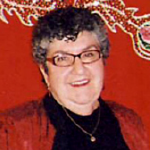
The following story was written by Liz Lippa and shared as part of the Memory Project.
My first American school experience was with a teacher who would definitely have been diagnosed as mentally ill today. I was dumped into a third grade class the month after I arrived in Richmond, Virginia from Montevideo, Uruguay. I might as well have been dropped down from Mars. I was a pudgy, girl with dark, curly hair and almost no English. The teacher was Miss Thompson, a tall, skinny woman who wore severely tailored clothes. I don’t think she ever smiled, and her voice came out in sharp, short syllables. She seemed to wear a permanent scowl, but her worst facial expression was saved for the Jewish kids. There were three of us, and I was, of course, the only foreign child, so I was particularly abhorrent to her.
In Uruguay, since first grade, I had written in cursive with an ink pen that had to be dipped into an ink jar and very carefully swiped on the edge to eliminate the extra ink. Not to do so very carefully would result in an ugly blot on the page, and that cost you a good grade. In the U.S., kids were printing with a pencil in third grade, and, about halfway through the year, we learned cursive writing. The method used to teach us was extremely tedious and very awkward for me. First, I had to learn to print, and then to write in a whole different way. In addition, I was struggling to learn English at the same time, so I was probably not one of her star pupils.
I cannot remember what I did or did not do that made her so angry, but she would come up very close to me, squeeze my arms in a vice grip, put her face about three inches from my own, cross her eyes, and growl at me through gritted teeth. She terrified me. The hate in her eyes was something I had never experienced in my life, and I knew it was somehow connected to my being Jewish. The other two Jewish kids were frightened so badly on two occasions that they wet their pants! Of course, their humiliation was made public and was so severe that I was determined never to let that happen to me. I cannot imagine how I ever learned anything that year, but I did live through it.
I don’t ever remember telling anyone in my family about this experience. I doubt that they would have done anything about it if I had told them about her. They were fraught with their own challenges. I knew better than to add to their burdens. All my life I knew that, had we not been able to escape the Nazis, being Jewish would have cost us our lives. I was also aware that many members of my family had not been so fortunate. In Uruguay, kids called us names because we were Jewish, but they were only kids. It was not until I came to the United States, “the home of brave and the land of the free,” that I experienced firsthand the horror of being personally hated and oppressed by an adult who had power over me, and I knew it was because I was Jewish. I know now that it was an isolated incident, and there were other teachers who, in the future, would be kinder to me, but, as a nine-year-old in a foreign land, I got a clear message that I was an undesirable person.
I will never know how deep and lasting her effect was on me, but I know it was a formidable experience. As an adult and a mother of six children, I became a Sunday School teacher, and I was determined never to treat any child in my class, no matter how difficult, in a humiliating manner. With the kids, I was a very popular Sunday school teacher, and it was a great experience for me. I still see some of the “kids” I taught, and they always tell me and my own children that they remember me as their favorite Sunday School teacher. I believe that, even from our worst experiences, something wonderful can be born.
(August 2006)

